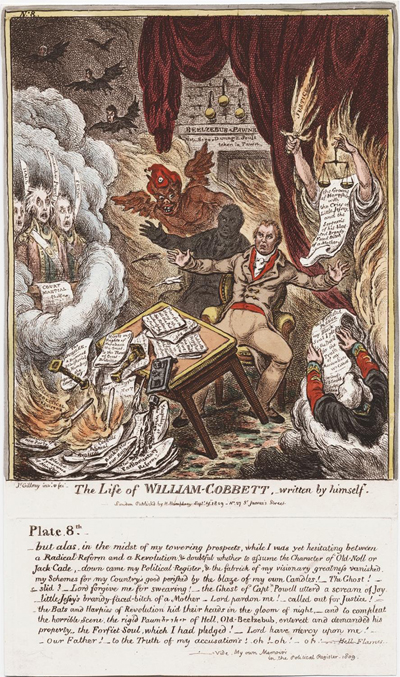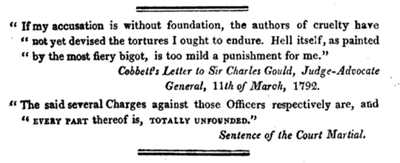The Life of William Cobbett, Written by Himself Pl. 8.
This is the eighth and final plate in Gillray's eight plate series, The Life of William Cobbett, Written by Himself which pretends to be a kind of graphic autobiography, but is, in fact a a not so veiled attack upon Cobbett himself. For the general context of the series in Gillray's work, some background about Cobbett, and the more immediate impetus for the set of plates, see my Introduction.

© Lewis Walpole Library Yale University
This wonderfully surreal plate brings Cobbett's story up to the present day (September 1809), and to the conclusion that many in the Portland administration, especially Canning, must have wished for. Cobbett is shown at his desk working on his Political Register, startled and surrounded by apparitions from his past, both distant and recent. Papers parodying the tone and tenor of articles he was famous for, fly off his overturned desk. They include "Stupidity of the Whigs," "Blasted Ignorance of Ministry," "Hints on ye Rights of Napoleone the Great to the Throne of Great Britain," and "Necessity of a new Party."
The caption elaborates on the image.
_but alas, in the midst of my towering prospects, while I was yet hesitating between a Radical-Reform and a Revolution, amp; doubtful whether to assume the Character of Old-Noll or Jack-Cade,_down came my Political-Register, & the fabrick of my visionary greatness vanished. my Schemes for my Country's good perished by the blaze of my own Candles!_The Ghost!_slid?_Lord forgive me for swearing!_the Ghost of Captn Powell utter'd a scream of Joy._little Jessy's brandy-faced-bitch of a Mother_Lord pardon me!_called out for Justice!_ye Bats and Harpies of Revolution hid their heads in the gloom of night,_and to compleat the horrible Scene, the rigid Pawn-broker of Hell, Old-Beelzebub, entered and demanded his property,_the Forfiet-Soul, which I had pledged!_Lord have mercy upon me!_Our Father!_to the Truth of my accusation's!_oh!_oh!_oh!_Hell-Flames. . __Vide My own Memoirs in the Political Register-1809.'
Jack Cade was the leader of a rebellion in 1450 whose objective (closer to Cobbett's) was the rooting out of corruption among the King's ministers. "Old Noll," on the other hand, is Oliver Cromwell, the M.P., and General who led the Parliamentary forces against the Royalists during the English Civil War, and one of those responsible for the execution of then King Charles the First. The mention of either, however, was like the mention of Lord Edward Fitzgerald, in previous plates, sufficient to damn Cobbett for most people.
Directly in front of him, the ghostly return of his dead regimental superiors (Powell, Seton, and Hall) accused by Cobbett in 1792 reflects what Cobbett must have felt in discovering that his whole failed effort to bring the officers to justice was now being resurrected seventeen years later in the May 1809 publication of Proceedings of [the] General Court Martial. And if there were any doubts of the attitude of its publishers towards Cobbett, the epigraphs from the title page of the Proceedings make it abundantly clear.

© Google Books
It is certainly no accident that Cobbett's oath and the failed prosecution of Powell Seton, and Hall figure so prominently in both the title page of the Proceedings and Gillray's series. And this "coincidence" may also explain why the plates featuring the oath and the trial (plates 5 and 7) are among the three plates where Gillray's signature implies that he received ideas or input from outside sources.
Behind him we also see the figure of Justice with raised sword and a scroll inscribed with "the Groans of Hampshire with the Cries of Little Jessey and the Screams of his blasted Brandy-Faced Bitch of a Mother." This refers to the very recent (July, 1809)) and successful action for assault and false imprisonment brought against Cobbett by Betty Burgess on hehalf of her son, Jesse, (a runaway servant of Cobbett's) as recently as July of 1809. (See the London Pilot for July 22, p. 3-4.) The charge and reference is certainly intended to recall the violent and oppressive Cobbett of Plate 1 and Plate 3. But the timing of this incident and its thorough coverage in the same newspaper that advertised the falsified Elements of Reform and the Proceedings of [the] General Court Martial make one wonder if this too were not another part of the overall plan to discredit Cobbett.
In addition to describing the dramatic and wished for fulfillment of Cobbett's pact with the devil, the final plate and caption suggest the demise of The Political Register. But though Cobbett was indicted (and eventually imprisoned) for an article on the flogging of soldiers of the British militia by German mercenaries, the publication of the Register continued uninterrupted until Cobbett's death in 1835.
←BACK |
Sources and Reading
- Commentary from the British Museum on The Life of William Cobbett, Written by Himself Pl. 8.
- Draper Hill, Mr. Gillray The Caricaturist, 1965, p. 117, 144n
- "Jack Cade's Rebellion," Wikipedia
- "William Cobbett," Wikipedia
- "Oliver Cromwell," Wikipedia
- "Sir Charles Morgan (aka Gould), 1st Baronet," Wikipedia
- The Life and Adventures of Peter Porcupine (1797)
- Cobbett's Weekly Political Register , June 17, 1809
- Thomas Wright and R.H. Evans, Historical and Descriptive Account of the Caricatures of James Gillray #365.
- Thomas Wright and Joseph Grego, The Works of James Gillray, the Caricaturist; With the History of His Life and Times, p. 365-366 .
Comments & Corrections
NOTE: Comments and/or corrections are always appreciated. To make that easier, I have included a form below that you can use. I promise never to share any of the info provided without your express permission.